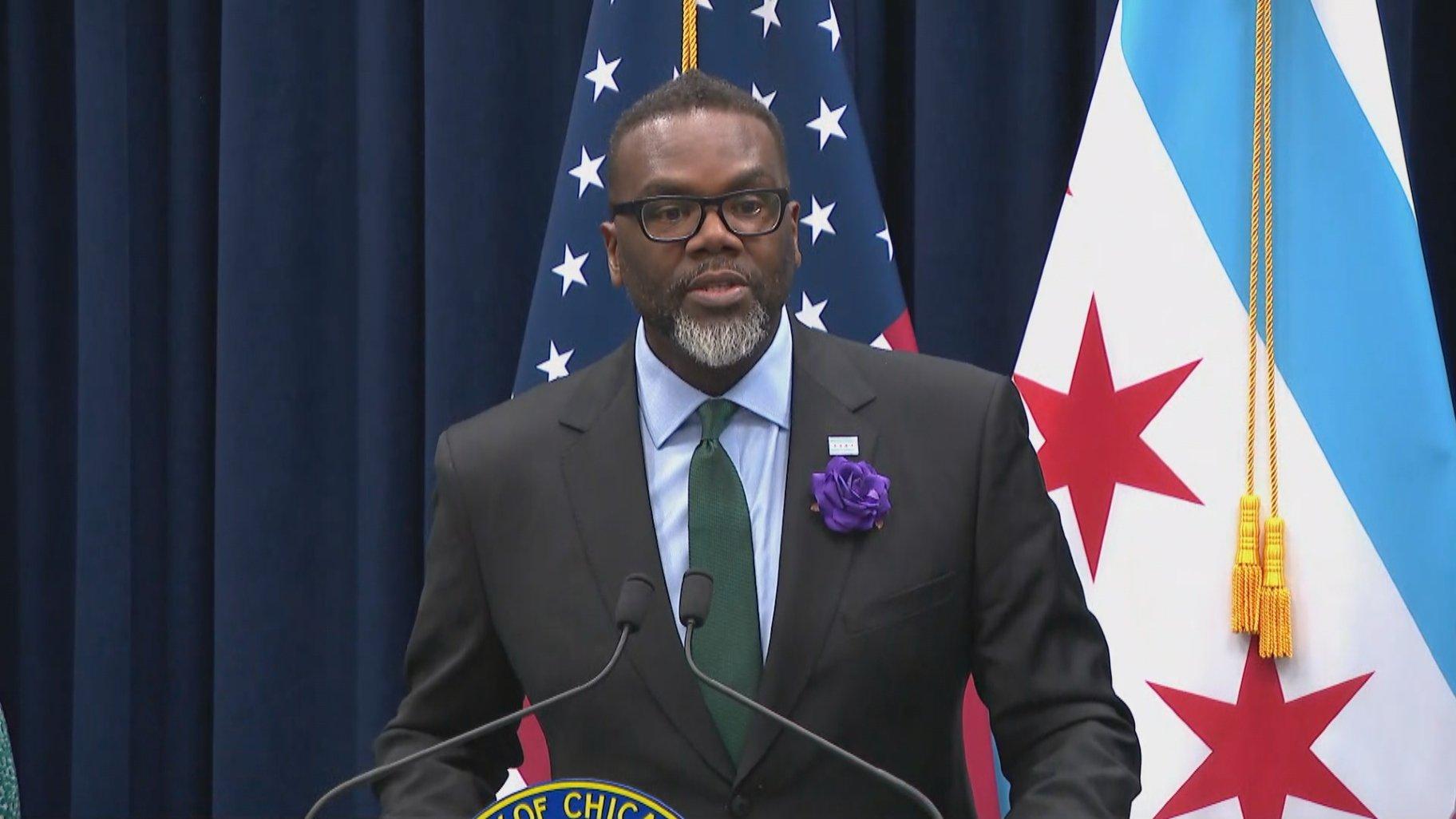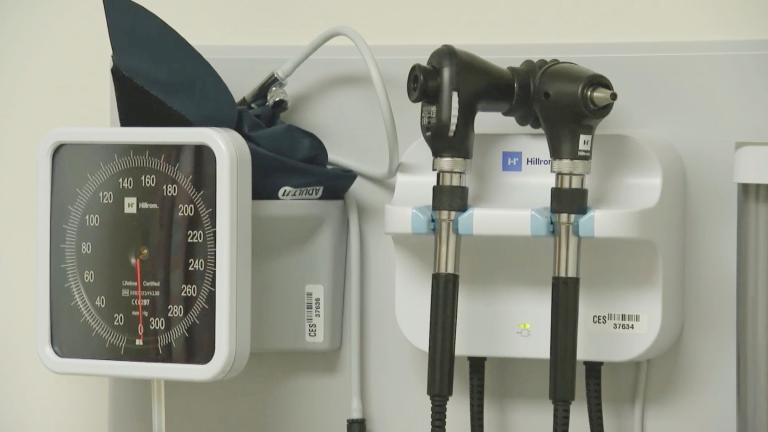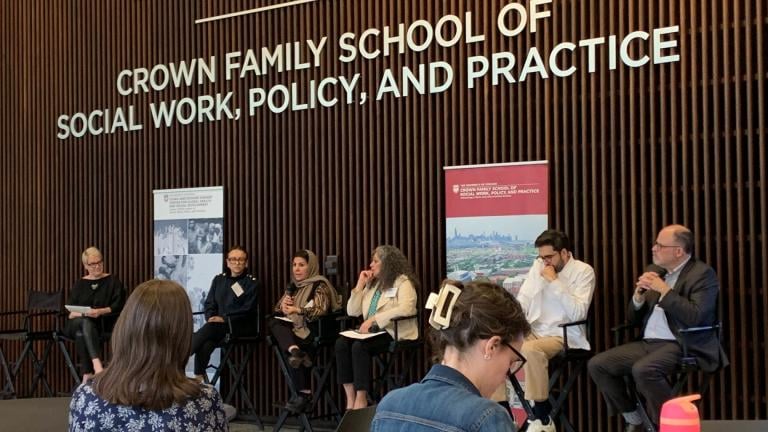 Mayor Brandon Johnson speaks at a news conference Wednesday, March 20, 2024. (WTTW News)
Mayor Brandon Johnson speaks at a news conference Wednesday, March 20, 2024. (WTTW News)
A key city panel advanced a proposal from Mayor Brandon Johnson to spend an additional $70 million to house, feed and care for the men, women and children sent to Chicago from the southern border after hours of fraught debate Monday.
The City Council’s Budget Committee voted 20-8 to advance the proposal to the full City Council, which could vote on it as early as Wednesday. The panel also agreed to accept $48 million in federal and state grants to care for the migrants.
The vote came six weeks after Johnson pointedly declined to join Illinois Gov. J.B. Pritzker and Cook County Board President Toni Preckwinkle when they announced an agreement to set aside an additional $250 million to care for the migrants through the end of the year.
Johnson’s decision to ask the City Council to amend the city’s 2024 budget is an acknowledgment that city officials’ repeated and impassioned pleas for help from the federal government in addressing the humanitarian crisis engulfing the city had fallen on deaf ears, alderpeople said.
Ald. Daniel La Spata (1st Ward) said that six months ago, he was sure the federal government would provide significant financial help to Chicago to care for the migrants.
“I am surprised by the wholly inadequate federal response,” La Spata said. “They have chosen to do nothing.”
Ald. Walter Burnett (27th Ward) said the city had no choice but to set aside more money to care for the migrants.
“I know this is hard, but we have to do this,” Burnett said. “If we don’t, something’s gonna bust.”
The funds are set to come from the city’s 2022 budget surplus, Budget Director Annette Guzman told the Budget Committee.
If the City Council fails to act, Chicago’s unhoused population will swell, and more people will have no choice but to camp on city streets and parks, Guzman said.
“The unintended and indirect costs will soar,” Guzman said.
But Ald. Chris Taliaferro (29th Ward) was not convinced by those arguments.
“We are forgetting about the residents who live here,” said Taliaferro, adding that he is deeply angry about the halting response by the federal government to intense flooding in July in his West Side ward.
Taliaferro’s remarks brought a response from La Spata on X, the social media platform once known as Twitter.
“All I know is that when the needs of poor Black people are pitted against the needs of poor Latine people, the only winners are the wealthy interests controlling the system,” La Spata wrote. “Really and truly, who’s telling you we need to choose between flooding relief for Black households or shelter for migrants? Ask yourself where that messaging really comes from and who benefits from that argument?”
A “joint planning effort” by state, city and county officials released in February pegged the current cost of caring for the migrants at an additional $321 million through the end of 2024, according to a joint statement from Pritzker and Preckwinkle.
Shortly after taking office, Johnson pushed through a proposal first made by former Mayor Lori Lightfoot to spend $51 million to care for the migrants. The 34-13 vote to approve that plan came after tension between Black and Latino Chicagoans boiled over, resulting in an intense debate that featured racist abuse from the gallery.
The city’s 2024 budget, approved in November, set aside $150 million to care for the migrants, even though that was a little more than half of what the city spent to care for Chicago’s newest arrivals in 2023.
Johnson asked the City Council to earmark less than the full projected cost to care for the migrants to acknowledge that the burden should not fall entirely on Chicago taxpayers, Cristina Pacione Zayas, who is now Johnson’s chief of staff, told reporters in October.
There are no plans to come back to the City Council for additional money to pay for the effort to care for the migrants in 2024, Guzman said.
In all, Chicago taxpayers spent $87.4 million between August 2022 and April 10 to care for the approximately 39,000 migrants. Another $223 million in grant funds from the state and federal governments were used to care for the migrants, according to city records.
All of the migrants are in the country legally after requesting asylum and most were sent to Chicago by Texas Gov. Greg Abbott, a Republican, as part of an effort to damage President Joe Biden’s chances for reelection and divide Democratic voters.
In briefings with City Council members this week, Johnson urged the City Council to approve the additional funds to prevent chaos in the weeks leading up to the Democratic National Convention. City officials have been warning for more than a year that the convention — and its white-hot spotlight — will trigger a new surge of migrants to Chicago alongside the seasonal increase of people crossing the southern border to request asylum.
The decision by Pritzker and Preckwinkle to jointly announce new funds to care for migrants without Johnson revealed a deep breach between the mayor and the governor over the migrant crisis and an indication of significant tension between Johnson and Preckwinkle, who have been close political allies.
Johnson repeatedly declined to answer questions about whether he reneged on that commitment — or even if he promised to take it to the City Council — at a contentious news conference after the Feb. 15 City Council meeting.
During that news conference, Johnson repeatedly reminded reporters that Pritzker pledged to use $65 million to open a 200-bed shelter in a vacant CVS drugstore in Little Village and to house another 2,000 migrants in a massive, winterized base camp. Plans to build that structure in Brighton Park were scuttled by state officials, citing environmental concerns.
State officials have promised to bring 2,000 new shelter beds online to handle the expected increase in the months before the convention, Guzman said. In addition, some the state funds set to be included in the 2024 budget will be sent to the city to help defray its costs.
State lawmakers are weighing Pritzker’s request to include $182 million in the state’s budget for migrant care for the 2025 fiscal year, which starts July 1.
Through mid-November, the state had already spent $478 million to care for the migrants, state officials said.
Fewer than 9,200 people were living in 18 city facilities as of Monday, a 22% drop since March 15, according to city data.
Since city officials began enforcing a 60-day limit on shelter stays, 132 people have been forced to leave city facilities, according to city data.
City officials are continuing to fight a measles outbreak at the city’s largest shelter for migrants, located in Pilsen. Three cases have been confirmed in the past seven days, according to city data.
Contact Heather Cherone: @HeatherCherone | (773) 569-1863 | [email protected]








